Spam_mail
스팸 메일 분류로 배우는 머신러닝 Using R
안녕하세요. 이번 글에서는 권재명선생님께서 쓰신 책의 주제와 코드를 중심으로
의사결정나무(Decision Tree)와 앙상블(Ensemble) 기법 중 하나인 랜덤포레스트(Random Forest)를 활용하여
스팸 메일을 분류하는 모델을 학습시켜 보도록 하겠습니다.
우선 데이터는 CUI Machine Learning Reapository에서 ‘spambase.data’, ‘spambase.names’ 파일을
setwd로 설정한 디렉토리에 다운받아 저장합니다.
reference: Dua, D. and Graff, C. (2019). UCI Machine Learning Repository [http://archive.ics.uci.edu/ml]. Irvine, CA: University of California, School of Information and Computer Science.
해당 데이터에 대한 자세한 설명은 링크를 참고해주세요.
요약하자면,
-
행: 4,601(사례), 열: 58(변수/Feature)
-
58번째 Feature는
Label Data로 스팸인 지(spam=1) 아닌지(=0)를 나타냄
연구 절차는 다음과 같습니다.
- 시스템 세팅
- 데이터 이해(기초 분석 및 시각화)
- 데이터 분할
- 의사결정나무 모형(Decision Tree)
- 랜덤포레스트(Random Forest)
- 모형 평가, 해석 및 선택
시스템 세팅
먼저 관련 패키지를 설치하고, 불러옵니다.
#install.packages(c( "randomForest", "rpart","boot","data.table", caret" ))
#install.packages(c( "rattle", "rpart.plot", "RColorBrewer", "e1071"))
library(dplyr); library(ggplot2); library(MASS); library(randomForest); library(rpart); library(boot); library(data.table); library(caret)
##
## Attaching package: 'dplyr'
## The following objects are masked from 'package:stats':
##
## filter, lag
## The following objects are masked from 'package:base':
##
## intersect, setdiff, setequal, union
##
## Attaching package: 'MASS'
## The following object is masked from 'package:dplyr':
##
## select
## randomForest 4.6-14
## Type rfNews() to see new features/changes/bug fixes.
##
## Attaching package: 'randomForest'
## The following object is masked from 'package:ggplot2':
##
## margin
## The following object is masked from 'package:dplyr':
##
## combine
##
## Attaching package: 'data.table'
## The following objects are masked from 'package:dplyr':
##
## between, first, last
## Loading required package: lattice
##
## Attaching package: 'lattice'
## The following object is masked from 'package:boot':
##
## melanoma
다음으로는 데이터를 로드합니다.
data <- tbl_df(read.table("spambase.data", strip.white = TRUE,
sep=",", header = FALSE)) #dplyr 패키지 함수 입니다.
#해당 파일이 워크디렉토리안에 저장되어 있어야 합니다.
names(data) <- #Feature의 이름을 입력합니다.
c('word_freq_make', 'word_freq_address', 'word_freq_all', 'word_freq_3d', 'word_freq_our',
'word_freq_over', 'word_freq_remove', 'word_freq_internet', 'word_freq_order', 'word_freq_mail',
'word_freq_receive', 'word_freq_will', 'word_freq_people', 'word_freq_report', 'word_freq_addresses',
'word_freq_free', 'word_freq_business', 'word_freq_email', 'word_freq_you', 'word_freq_credit',
'word_freq_your', 'word_freq_font', 'word_freq_000', 'word_freq_money', 'word_freq_hp',
'word_freq_hpl', 'word_freq_george', 'word_freq_650', 'word_freq_lab', 'word_freq_labs',
'word_freq_telnet', 'word_freq_857', 'word_freq_data', 'word_freq_415', 'word_freq_85',
'word_freq_technology', 'word_freq_1999', 'word_freq_parts', 'word_freq_pm', 'word_freq_direct',
'word_freq_cs', 'word_freq_meeting', 'word_freq_original', 'word_freq_project', 'word_freq_re',
'word_freq_edu', 'word_freq_table', 'word_freq_conference', 'char_freq_;', 'char_freq_(',
'char_freq_[', 'char_freq_!', 'char_freq_$', 'char_freq_#', 'capital_run_length_average',
'capital_run_length_longest', 'capital_run_length_total', 'class' #class 변수가 Label Data 입니다.
)
data$class <- factor(data$class) #범주형 변수로 변환(스팸메일 인지/아닌지 이기 때문에 범주형 입니다.)
데이터 이해(기초 분석 및 시각화)
간단한 코드를 통해 데이터에 대한 이해를 높일 수 있습니다.
데이터의 내용을 이해하지 못하면, 머신러닝 모델 결과의 올바른 해석이 불가능합니다.
또한 상관 계수와 산점도를 확인해 보는 것도 데이터의 이해를 높이는데 좋은 방법입니다.
glimpse(data) #str(data) 비교해보는 것도 좋을 것 같습니다.
## Observations: 4,601
## Variables: 58
## $ word_freq_make <dbl> 0.00, 0.21, 0.06, 0.00, 0.00, 0.00, 0.00...
## $ word_freq_address <dbl> 0.64, 0.28, 0.00, 0.00, 0.00, 0.00, 0.00...
## $ word_freq_all <dbl> 0.64, 0.50, 0.71, 0.00, 0.00, 0.00, 0.00...
## $ word_freq_3d <dbl> 0, 0, 0, 0, 0, 0, 0, 0, 0, 0, 0, 0, 0, 0...
## $ word_freq_our <dbl> 0.32, 0.14, 1.23, 0.63, 0.63, 1.85, 1.92...
## $ word_freq_over <dbl> 0.00, 0.28, 0.19, 0.00, 0.00, 0.00, 0.00...
## $ word_freq_remove <dbl> 0.00, 0.21, 0.19, 0.31, 0.31, 0.00, 0.00...
## $ word_freq_internet <dbl> 0.00, 0.07, 0.12, 0.63, 0.63, 1.85, 0.00...
## $ word_freq_order <dbl> 0.00, 0.00, 0.64, 0.31, 0.31, 0.00, 0.00...
## $ word_freq_mail <dbl> 0.00, 0.94, 0.25, 0.63, 0.63, 0.00, 0.64...
## $ word_freq_receive <dbl> 0.00, 0.21, 0.38, 0.31, 0.31, 0.00, 0.96...
## $ word_freq_will <dbl> 0.64, 0.79, 0.45, 0.31, 0.31, 0.00, 1.28...
## $ word_freq_people <dbl> 0.00, 0.65, 0.12, 0.31, 0.31, 0.00, 0.00...
## $ word_freq_report <dbl> 0.00, 0.21, 0.00, 0.00, 0.00, 0.00, 0.00...
## $ word_freq_addresses <dbl> 0.00, 0.14, 1.75, 0.00, 0.00, 0.00, 0.00...
## $ word_freq_free <dbl> 0.32, 0.14, 0.06, 0.31, 0.31, 0.00, 0.96...
## $ word_freq_business <dbl> 0.00, 0.07, 0.06, 0.00, 0.00, 0.00, 0.00...
## $ word_freq_email <dbl> 1.29, 0.28, 1.03, 0.00, 0.00, 0.00, 0.32...
## $ word_freq_you <dbl> 1.93, 3.47, 1.36, 3.18, 3.18, 0.00, 3.85...
## $ word_freq_credit <dbl> 0.00, 0.00, 0.32, 0.00, 0.00, 0.00, 0.00...
## $ word_freq_your <dbl> 0.96, 1.59, 0.51, 0.31, 0.31, 0.00, 0.64...
## $ word_freq_font <dbl> 0, 0, 0, 0, 0, 0, 0, 0, 0, 0, 0, 0, 0, 0...
## $ word_freq_000 <dbl> 0.00, 0.43, 1.16, 0.00, 0.00, 0.00, 0.00...
## $ word_freq_money <dbl> 0.00, 0.43, 0.06, 0.00, 0.00, 0.00, 0.00...
## $ word_freq_hp <dbl> 0, 0, 0, 0, 0, 0, 0, 0, 0, 0, 0, 0, 0, 0...
## $ word_freq_hpl <dbl> 0, 0, 0, 0, 0, 0, 0, 0, 0, 0, 0, 0, 0, 0...
## $ word_freq_george <dbl> 0, 0, 0, 0, 0, 0, 0, 0, 0, 0, 0, 0, 0, 0...
## $ word_freq_650 <dbl> 0.00, 0.00, 0.00, 0.00, 0.00, 0.00, 0.00...
## $ word_freq_lab <dbl> 0, 0, 0, 0, 0, 0, 0, 0, 0, 0, 0, 0, 0, 0...
## $ word_freq_labs <dbl> 0, 0, 0, 0, 0, 0, 0, 0, 0, 0, 0, 0, 0, 0...
## $ word_freq_telnet <dbl> 0, 0, 0, 0, 0, 0, 0, 0, 0, 0, 0, 0, 0, 0...
## $ word_freq_857 <dbl> 0, 0, 0, 0, 0, 0, 0, 0, 0, 0, 0, 0, 0, 0...
## $ word_freq_data <dbl> 0.00, 0.00, 0.00, 0.00, 0.00, 0.00, 0.00...
## $ word_freq_415 <dbl> 0, 0, 0, 0, 0, 0, 0, 0, 0, 0, 0, 0, 0, 0...
## $ word_freq_85 <dbl> 0, 0, 0, 0, 0, 0, 0, 0, 0, 0, 0, 0, 0, 0...
## $ word_freq_technology <dbl> 0.00, 0.00, 0.00, 0.00, 0.00, 0.00, 0.00...
## $ word_freq_1999 <dbl> 0.00, 0.07, 0.00, 0.00, 0.00, 0.00, 0.00...
## $ word_freq_parts <dbl> 0, 0, 0, 0, 0, 0, 0, 0, 0, 0, 0, 0, 0, 0...
## $ word_freq_pm <dbl> 0, 0, 0, 0, 0, 0, 0, 0, 0, 0, 0, 0, 0, 0...
## $ word_freq_direct <dbl> 0.00, 0.00, 0.06, 0.00, 0.00, 0.00, 0.00...
## $ word_freq_cs <dbl> 0, 0, 0, 0, 0, 0, 0, 0, 0, 0, 0, 0, 0, 0...
## $ word_freq_meeting <dbl> 0, 0, 0, 0, 0, 0, 0, 0, 0, 0, 0, 0, 0, 0...
## $ word_freq_original <dbl> 0.00, 0.00, 0.12, 0.00, 0.00, 0.00, 0.00...
## $ word_freq_project <dbl> 0.00, 0.00, 0.00, 0.00, 0.00, 0.00, 0.00...
## $ word_freq_re <dbl> 0.00, 0.00, 0.06, 0.00, 0.00, 0.00, 0.00...
## $ word_freq_edu <dbl> 0.00, 0.00, 0.06, 0.00, 0.00, 0.00, 0.00...
## $ word_freq_table <dbl> 0, 0, 0, 0, 0, 0, 0, 0, 0, 0, 0, 0, 0, 0...
## $ word_freq_conference <dbl> 0, 0, 0, 0, 0, 0, 0, 0, 0, 0, 0, 0, 0, 0...
## $ `char_freq_;` <dbl> 0.000, 0.000, 0.010, 0.000, 0.000, 0.000...
## $ `char_freq_(` <dbl> 0.000, 0.132, 0.143, 0.137, 0.135, 0.223...
## $ `char_freq_[` <dbl> 0.000, 0.000, 0.000, 0.000, 0.000, 0.000...
## $ `char_freq_!` <dbl> 0.778, 0.372, 0.276, 0.137, 0.135, 0.000...
## $ `char_freq_$` <dbl> 0.000, 0.180, 0.184, 0.000, 0.000, 0.000...
## $ `char_freq_#` <dbl> 0.000, 0.048, 0.010, 0.000, 0.000, 0.000...
## $ capital_run_length_average <dbl> 3.756, 5.114, 9.821, 3.537, 3.537, 3.000...
## $ capital_run_length_longest <int> 61, 101, 485, 40, 40, 15, 4, 11, 445, 43...
## $ capital_run_length_total <int> 278, 1028, 2259, 191, 191, 54, 112, 49, ...
## $ class <fct> 1, 1, 1, 1, 1, 1, 1, 1, 1, 1, 1, 1, 1, 1...
summary(data)
## word_freq_make word_freq_address word_freq_all word_freq_3d
## Min. :0.0000 Min. : 0.000 Min. :0.0000 Min. : 0.00000
## 1st Qu.:0.0000 1st Qu.: 0.000 1st Qu.:0.0000 1st Qu.: 0.00000
## Median :0.0000 Median : 0.000 Median :0.0000 Median : 0.00000
## Mean :0.1046 Mean : 0.213 Mean :0.2807 Mean : 0.06542
## 3rd Qu.:0.0000 3rd Qu.: 0.000 3rd Qu.:0.4200 3rd Qu.: 0.00000
## Max. :4.5400 Max. :14.280 Max. :5.1000 Max. :42.81000
## word_freq_our word_freq_over word_freq_remove word_freq_internet
## Min. : 0.0000 Min. :0.0000 Min. :0.0000 Min. : 0.0000
## 1st Qu.: 0.0000 1st Qu.:0.0000 1st Qu.:0.0000 1st Qu.: 0.0000
## Median : 0.0000 Median :0.0000 Median :0.0000 Median : 0.0000
## Mean : 0.3122 Mean :0.0959 Mean :0.1142 Mean : 0.1053
## 3rd Qu.: 0.3800 3rd Qu.:0.0000 3rd Qu.:0.0000 3rd Qu.: 0.0000
## Max. :10.0000 Max. :5.8800 Max. :7.2700 Max. :11.1100
## word_freq_order word_freq_mail word_freq_receive word_freq_will
## Min. :0.00000 Min. : 0.0000 Min. :0.00000 Min. :0.0000
## 1st Qu.:0.00000 1st Qu.: 0.0000 1st Qu.:0.00000 1st Qu.:0.0000
## Median :0.00000 Median : 0.0000 Median :0.00000 Median :0.1000
## Mean :0.09007 Mean : 0.2394 Mean :0.05982 Mean :0.5417
## 3rd Qu.:0.00000 3rd Qu.: 0.1600 3rd Qu.:0.00000 3rd Qu.:0.8000
## Max. :5.26000 Max. :18.1800 Max. :2.61000 Max. :9.6700
## word_freq_people word_freq_report word_freq_addresses word_freq_free
## Min. :0.00000 Min. : 0.00000 Min. :0.0000 Min. : 0.0000
## 1st Qu.:0.00000 1st Qu.: 0.00000 1st Qu.:0.0000 1st Qu.: 0.0000
## Median :0.00000 Median : 0.00000 Median :0.0000 Median : 0.0000
## Mean :0.09393 Mean : 0.05863 Mean :0.0492 Mean : 0.2488
## 3rd Qu.:0.00000 3rd Qu.: 0.00000 3rd Qu.:0.0000 3rd Qu.: 0.1000
## Max. :5.55000 Max. :10.00000 Max. :4.4100 Max. :20.0000
## word_freq_business word_freq_email word_freq_you word_freq_credit
## Min. :0.0000 Min. :0.0000 Min. : 0.000 Min. : 0.00000
## 1st Qu.:0.0000 1st Qu.:0.0000 1st Qu.: 0.000 1st Qu.: 0.00000
## Median :0.0000 Median :0.0000 Median : 1.310 Median : 0.00000
## Mean :0.1426 Mean :0.1847 Mean : 1.662 Mean : 0.08558
## 3rd Qu.:0.0000 3rd Qu.:0.0000 3rd Qu.: 2.640 3rd Qu.: 0.00000
## Max. :7.1400 Max. :9.0900 Max. :18.750 Max. :18.18000
## word_freq_your word_freq_font word_freq_000 word_freq_money
## Min. : 0.0000 Min. : 0.0000 Min. :0.0000 Min. : 0.00000
## 1st Qu.: 0.0000 1st Qu.: 0.0000 1st Qu.:0.0000 1st Qu.: 0.00000
## Median : 0.2200 Median : 0.0000 Median :0.0000 Median : 0.00000
## Mean : 0.8098 Mean : 0.1212 Mean :0.1016 Mean : 0.09427
## 3rd Qu.: 1.2700 3rd Qu.: 0.0000 3rd Qu.:0.0000 3rd Qu.: 0.00000
## Max. :11.1100 Max. :17.1000 Max. :5.4500 Max. :12.50000
## word_freq_hp word_freq_hpl word_freq_george word_freq_650
## Min. : 0.0000 Min. : 0.0000 Min. : 0.0000 Min. :0.0000
## 1st Qu.: 0.0000 1st Qu.: 0.0000 1st Qu.: 0.0000 1st Qu.:0.0000
## Median : 0.0000 Median : 0.0000 Median : 0.0000 Median :0.0000
## Mean : 0.5495 Mean : 0.2654 Mean : 0.7673 Mean :0.1248
## 3rd Qu.: 0.0000 3rd Qu.: 0.0000 3rd Qu.: 0.0000 3rd Qu.:0.0000
## Max. :20.8300 Max. :16.6600 Max. :33.3300 Max. :9.0900
## word_freq_lab word_freq_labs word_freq_telnet word_freq_857
## Min. : 0.00000 Min. :0.0000 Min. : 0.00000 Min. :0.00000
## 1st Qu.: 0.00000 1st Qu.:0.0000 1st Qu.: 0.00000 1st Qu.:0.00000
## Median : 0.00000 Median :0.0000 Median : 0.00000 Median :0.00000
## Mean : 0.09892 Mean :0.1029 Mean : 0.06475 Mean :0.04705
## 3rd Qu.: 0.00000 3rd Qu.:0.0000 3rd Qu.: 0.00000 3rd Qu.:0.00000
## Max. :14.28000 Max. :5.8800 Max. :12.50000 Max. :4.76000
## word_freq_data word_freq_415 word_freq_85 word_freq_technology
## Min. : 0.00000 Min. :0.00000 Min. : 0.0000 Min. :0.00000
## 1st Qu.: 0.00000 1st Qu.:0.00000 1st Qu.: 0.0000 1st Qu.:0.00000
## Median : 0.00000 Median :0.00000 Median : 0.0000 Median :0.00000
## Mean : 0.09723 Mean :0.04784 Mean : 0.1054 Mean :0.09748
## 3rd Qu.: 0.00000 3rd Qu.:0.00000 3rd Qu.: 0.0000 3rd Qu.:0.00000
## Max. :18.18000 Max. :4.76000 Max. :20.0000 Max. :7.69000
## word_freq_1999 word_freq_parts word_freq_pm word_freq_direct
## Min. :0.000 Min. :0.0000 Min. : 0.00000 Min. :0.00000
## 1st Qu.:0.000 1st Qu.:0.0000 1st Qu.: 0.00000 1st Qu.:0.00000
## Median :0.000 Median :0.0000 Median : 0.00000 Median :0.00000
## Mean :0.137 Mean :0.0132 Mean : 0.07863 Mean :0.06483
## 3rd Qu.:0.000 3rd Qu.:0.0000 3rd Qu.: 0.00000 3rd Qu.:0.00000
## Max. :6.890 Max. :8.3300 Max. :11.11000 Max. :4.76000
## word_freq_cs word_freq_meeting word_freq_original word_freq_project
## Min. :0.00000 Min. : 0.0000 Min. :0.0000 Min. : 0.0000
## 1st Qu.:0.00000 1st Qu.: 0.0000 1st Qu.:0.0000 1st Qu.: 0.0000
## Median :0.00000 Median : 0.0000 Median :0.0000 Median : 0.0000
## Mean :0.04367 Mean : 0.1323 Mean :0.0461 Mean : 0.0792
## 3rd Qu.:0.00000 3rd Qu.: 0.0000 3rd Qu.:0.0000 3rd Qu.: 0.0000
## Max. :7.14000 Max. :14.2800 Max. :3.5700 Max. :20.0000
## word_freq_re word_freq_edu word_freq_table word_freq_conference
## Min. : 0.0000 Min. : 0.0000 Min. :0.000000 Min. : 0.00000
## 1st Qu.: 0.0000 1st Qu.: 0.0000 1st Qu.:0.000000 1st Qu.: 0.00000
## Median : 0.0000 Median : 0.0000 Median :0.000000 Median : 0.00000
## Mean : 0.3012 Mean : 0.1798 Mean :0.005444 Mean : 0.03187
## 3rd Qu.: 0.1100 3rd Qu.: 0.0000 3rd Qu.:0.000000 3rd Qu.: 0.00000
## Max. :21.4200 Max. :22.0500 Max. :2.170000 Max. :10.00000
## char_freq_; char_freq_( char_freq_[ char_freq_!
## Min. :0.00000 Min. :0.000 Min. :0.00000 Min. : 0.0000
## 1st Qu.:0.00000 1st Qu.:0.000 1st Qu.:0.00000 1st Qu.: 0.0000
## Median :0.00000 Median :0.065 Median :0.00000 Median : 0.0000
## Mean :0.03857 Mean :0.139 Mean :0.01698 Mean : 0.2691
## 3rd Qu.:0.00000 3rd Qu.:0.188 3rd Qu.:0.00000 3rd Qu.: 0.3150
## Max. :4.38500 Max. :9.752 Max. :4.08100 Max. :32.4780
## char_freq_$ char_freq_# capital_run_length_average
## Min. :0.00000 Min. : 0.00000 Min. : 1.000
## 1st Qu.:0.00000 1st Qu.: 0.00000 1st Qu.: 1.588
## Median :0.00000 Median : 0.00000 Median : 2.276
## Mean :0.07581 Mean : 0.04424 Mean : 5.191
## 3rd Qu.:0.05200 3rd Qu.: 0.00000 3rd Qu.: 3.706
## Max. :6.00300 Max. :19.82900 Max. :1102.500
## capital_run_length_longest capital_run_length_total class
## Min. : 1.00 Min. : 1.0 0:2788
## 1st Qu.: 6.00 1st Qu.: 35.0 1:1813
## Median : 15.00 Median : 95.0
## Mean : 52.17 Mean : 283.3
## 3rd Qu.: 43.00 3rd Qu.: 266.0
## Max. :9989.00 Max. :15841.0
data_1 <- subset(data, select = c(word_freq_make, word_freq_address, word_freq_all, class))
#모든 변수를 한꺼번에 그리는 것이 쉽지 않아, 부분적으로 먼저 확인해보겠습니다.
#아래 코드는 산점도 행렬의 위쪽에 상관계수 숫자를 집어넣는 사용자 정의 함수 입니다.
#출처: https://rfriend.tistory.com/83 [R, Python 분석과 프로그래밍의 친구 (by R Friend)]
panel.cor <- function(x, y, digits = 2, prefix = "", cex.cor, ...)
{
usr <- par("usr"); on.exit(par(usr))
par(usr = c(0, 1, 0, 1))
r <- abs(cor(x, y))
txt <- format(c(r, 0.123456789), digits = digits)[1]
txt <- paste0(prefix, txt)
if(missing(cex.cor)) cex.cor <- 0.8/strwidth(txt)
text(0.5, 0.5, txt, cex = cex.cor * r * 5)
}
pairs(data_1,
upper.panel = panel.cor, # 위쪽에는 상관계수 비례)
pch="*"
)
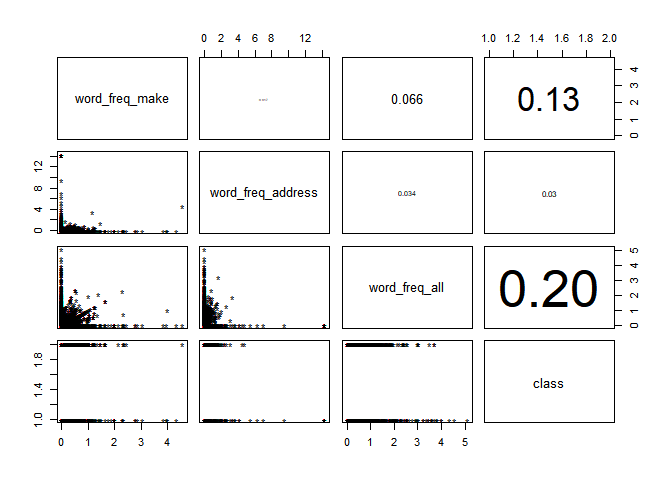
#57개 Feature 중 Label Data의 Class와 상관 관계가 가장 높은 변수는 어떤 변수인지 살펴보겠습니다.
tmp <- as.data.frame(cor(data[,-58], as.numeric(data$class)))
tmp <- tmp %>% rename(cor=V1)
tmp$var <- rownames(tmp)
tmp %>%
ggplot(aes(reorder(var, cor), cor)) +
geom_point() +
coord_flip()

데이터 분할
데이터 분할에 앞서서 데이터 전처리 과정이 필요합니다.
본 데이터는 CUI Machine Learning Reapository에서 전처리가 되어 제공되는 데이터지만,
본 연구에서 적용하는 RandomForest 패키지에서는 특수문자가 포함된 Feature는 모델에 사용할 수 없습니다.권재명(2017)
따라서, make.names함수를 활용하여 이 문제를 해결합니다.
old_names <- names(data)
new_names <- make.names(names(data), unique = TRUE)
cbind(old_names, new_names) [old_names!=new_names, ]
## old_names new_names
## [1,] "char_freq_;" "char_freq_."
## [2,] "char_freq_(" "char_freq_..1"
## [3,] "char_freq_[" "char_freq_..2"
## [4,] "char_freq_!" "char_freq_..3"
## [5,] "char_freq_$" "char_freq_..4"
## [6,] "char_freq_#" "char_freq_..5"
names(data) <- new_names
다음으로 caret패키지를 활용하여 데이터를 분할합니다.
여러가지 데이터 분할 방법이 있지만, 저는 이 방법이 가장 편하고 익숙합니다.^^
intrain<-createDataPartition(y=data$class, p=0.7, list=FALSE)
train<-data[intrain, ] #학습용 데이터 셋
test<-data[-intrain, ] #평가용 데이터 셋
Decision Tree
일반적으로 트리를 생성할 때 R에서는 tree, rpart, party와 같은 패키지를 많이 활용합니다.
하지만, 강력한 시각화를 장점으로 하고 있는 R에서 유독 Decision Tree만 시각화를 하면 괜히 미안해집니다.
이를 위해 DODOMIRA님께서 제시하신 rattle 패키지의 fancyrpartplot 함수를 활용한 방법으로 트리를 플로팅하였습니다.
트리 해석 또한 해당 블로그를 참고하시면 될 것 같습니다.
#install.packages(c("rattle", "rpart.plot", "RColorBrewer"))
library(rattle) # Fancy tree plot
## Rattle: A free graphical interface for data science with R.
## Version 5.3.0 Copyright (c) 2006-2018 Togaware Pty Ltd.
## Type 'rattle()' to shake, rattle, and roll your data.
##
## Attaching package: 'rattle'
## The following object is masked from 'package:randomForest':
##
## importance
library(rpart.plot) # Enhanced tree plots
library(RColorBrewer) # Color selection for fancy tree
rpart_spam<-rpart(class~. , data=data, method="class")
plot(rpart_spam); text(rpart_spam) #원래 rpart 패키지 트리
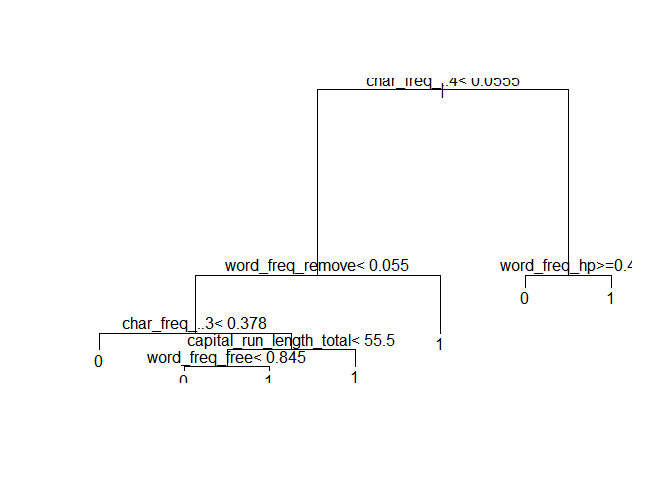
printcp(rpart_spam); plotcp(rpart_spam) #과적합 방지를 위해 cp(Complexity Parameter, 복잡성 매개변수)값을 통해 가지치기 실시
##
## Classification tree:
## rpart(formula = class ~ ., data = data, method = "class")
##
## Variables actually used in tree construction:
## [1] capital_run_length_total char_freq_..3 char_freq_..4
## [4] word_freq_free word_freq_hp word_freq_remove
##
## Root node error: 1813/4601 = 0.39404
##
## n= 4601
##
## CP nsplit rel error xerror xstd
## 1 0.476558 0 1.00000 1.00000 0.018282
## 2 0.148924 1 0.52344 0.54881 0.015403
## 3 0.043023 2 0.37452 0.45836 0.014393
## 4 0.030888 4 0.28847 0.33480 0.012661
## 5 0.010480 5 0.25758 0.27634 0.011654
## 6 0.010000 6 0.24710 0.26696 0.011479
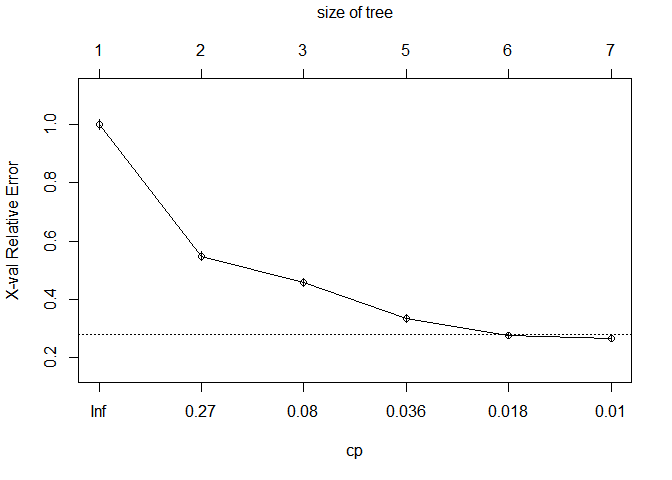
rpart_spam_pruning <-prune(rpart_spam,
cp = rpart_spam$cptable[which.min(rpart_spam$cptable[,"xerror"]),"CP"]
) #cp값으로 가지치기 한 트리 생성
summary(rpart_spam_pruning) #트리 요약값 정리
## Call:
## rpart(formula = class ~ ., data = data, method = "class")
## n= 4601
##
## CP nsplit rel error xerror xstd
## 1 0.47655819 0 1.0000000 1.0000000 0.01828190
## 2 0.14892443 1 0.5234418 0.5488141 0.01540283
## 3 0.04302261 2 0.3745174 0.4583563 0.01439287
## 4 0.03088803 4 0.2884721 0.3348042 0.01266119
## 5 0.01047987 5 0.2575841 0.2763376 0.01165432
## 6 0.01000000 6 0.2471042 0.2669608 0.01147861
##
## Variable importance
## char_freq_..4 word_freq_remove
## 29 13
## word_freq_000 word_freq_money
## 10 9
## char_freq_..3 capital_run_length_longest
## 7 7
## word_freq_credit word_freq_order
## 5 4
## word_freq_hp capital_run_length_total
## 4 3
## word_freq_hpl capital_run_length_average
## 2 1
## word_freq_your word_freq_free
## 1 1
## char_freq_..1 word_freq_our
## 1 1
## word_freq_telnet
## 1
##
## Node number 1: 4601 observations, complexity param=0.4765582
## predicted class=0 expected loss=0.3940448 P(node) =1
## class counts: 2788 1813
## probabilities: 0.606 0.394
## left son=2 (3471 obs) right son=3 (1130 obs)
## Primary splits:
## char_freq_..4 < 0.0555 to the left, improve=714.1697, (0 missing)
## char_freq_..3 < 0.0795 to the left, improve=711.9638, (0 missing)
## word_freq_remove < 0.01 to the left, improve=597.8504, (0 missing)
## word_freq_free < 0.095 to the left, improve=559.6634, (0 missing)
## word_freq_your < 0.605 to the left, improve=543.2496, (0 missing)
## Surrogate splits:
## word_freq_000 < 0.055 to the left, agree=0.839, adj=0.346, (0 split)
## word_freq_money < 0.045 to the left, agree=0.833, adj=0.321, (0 split)
## word_freq_credit < 0.025 to the left, agree=0.796, adj=0.169, (0 split)
## capital_run_length_longest < 71.5 to the left, agree=0.793, adj=0.158, (0 split)
## word_freq_order < 0.18 to the left, agree=0.792, adj=0.155, (0 split)
##
## Node number 2: 3471 observations, complexity param=0.1489244
## predicted class=0 expected loss=0.2350908 P(node) =0.7544012
## class counts: 2655 816
## probabilities: 0.765 0.235
## left son=4 (3141 obs) right son=5 (330 obs)
## Primary splits:
## word_freq_remove < 0.055 to the left, improve=331.3223, (0 missing)
## char_freq_..3 < 0.0915 to the left, improve=284.6134, (0 missing)
## word_freq_free < 0.135 to the left, improve=266.0164, (0 missing)
## word_freq_your < 0.615 to the left, improve=165.9929, (0 missing)
## capital_run_length_average < 3.6835 to the left, improve=158.6464, (0 missing)
## Surrogate splits:
## capital_run_length_longest < 131.5 to the left, agree=0.909, adj=0.045, (0 split)
## char_freq_..5 < 0.8325 to the left, agree=0.906, adj=0.012, (0 split)
## word_freq_3d < 7.125 to the left, agree=0.906, adj=0.009, (0 split)
## word_freq_business < 4.325 to the left, agree=0.906, adj=0.009, (0 split)
## word_freq_credit < 1.635 to the left, agree=0.906, adj=0.006, (0 split)
##
## Node number 3: 1130 observations, complexity param=0.03088803
## predicted class=1 expected loss=0.1176991 P(node) =0.2455988
## class counts: 133 997
## probabilities: 0.118 0.882
## left son=6 (70 obs) right son=7 (1060 obs)
## Primary splits:
## word_freq_hp < 0.4 to the right, improve=91.33732, (0 missing)
## word_freq_hpl < 0.12 to the right, improve=44.47552, (0 missing)
## char_freq_..3 < 0.0495 to the left, improve=40.43106, (0 missing)
## word_freq_1999 < 0.085 to the right, improve=35.90036, (0 missing)
## word_freq_george < 0.21 to the right, improve=34.65602, (0 missing)
## Surrogate splits:
## word_freq_hpl < 0.31 to the right, agree=0.965, adj=0.429, (0 split)
## word_freq_telnet < 0.045 to the right, agree=0.950, adj=0.186, (0 split)
## word_freq_650 < 0.025 to the right, agree=0.946, adj=0.129, (0 split)
## word_freq_george < 0.225 to the right, agree=0.945, adj=0.114, (0 split)
## word_freq_lab < 0.08 to the right, agree=0.945, adj=0.114, (0 split)
##
## Node number 4: 3141 observations, complexity param=0.04302261
## predicted class=0 expected loss=0.1642789 P(node) =0.6826777
## class counts: 2625 516
## probabilities: 0.836 0.164
## left son=8 (2737 obs) right son=9 (404 obs)
## Primary splits:
## char_freq_..3 < 0.378 to the left, improve=173.25510, (0 missing)
## word_freq_free < 0.2 to the left, improve=152.11900, (0 missing)
## capital_run_length_average < 3.638 to the left, improve= 79.00492, (0 missing)
## word_freq_your < 0.865 to the left, improve= 69.83959, (0 missing)
## word_freq_hp < 0.025 to the right, improve= 64.00030, (0 missing)
## Surrogate splits:
## word_freq_000 < 0.62 to the left, agree=0.875, adj=0.030, (0 split)
## word_freq_free < 2.415 to the left, agree=0.875, adj=0.027, (0 split)
## word_freq_money < 3.305 to the left, agree=0.872, adj=0.007, (0 split)
## word_freq_business < 1.305 to the left, agree=0.872, adj=0.005, (0 split)
## word_freq_order < 2.335 to the left, agree=0.872, adj=0.002, (0 split)
##
## Node number 5: 330 observations
## predicted class=1 expected loss=0.09090909 P(node) =0.07172354
## class counts: 30 300
## probabilities: 0.091 0.909
##
## Node number 6: 70 observations
## predicted class=0 expected loss=0.1 P(node) =0.01521408
## class counts: 63 7
## probabilities: 0.900 0.100
##
## Node number 7: 1060 observations
## predicted class=1 expected loss=0.06603774 P(node) =0.2303847
## class counts: 70 990
## probabilities: 0.066 0.934
##
## Node number 8: 2737 observations
## predicted class=0 expected loss=0.100475 P(node) =0.5948707
## class counts: 2462 275
## probabilities: 0.900 0.100
##
## Node number 9: 404 observations, complexity param=0.04302261
## predicted class=1 expected loss=0.4034653 P(node) =0.087807
## class counts: 163 241
## probabilities: 0.403 0.597
## left son=18 (182 obs) right son=19 (222 obs)
## Primary splits:
## capital_run_length_total < 55.5 to the left, improve=63.99539, (0 missing)
## capital_run_length_longest < 10.5 to the left, improve=54.95790, (0 missing)
## capital_run_length_average < 2.654 to the left, improve=53.67847, (0 missing)
## word_freq_free < 0.04 to the left, improve=40.70414, (0 missing)
## word_freq_our < 0.065 to the left, improve=25.38181, (0 missing)
## Surrogate splits:
## capital_run_length_longest < 12.5 to the left, agree=0.856, adj=0.681, (0 split)
## capital_run_length_average < 2.805 to the left, agree=0.757, adj=0.462, (0 split)
## word_freq_your < 0.115 to the left, agree=0.738, adj=0.418, (0 split)
## char_freq_..1 < 0.008 to the left, agree=0.693, adj=0.319, (0 split)
## word_freq_our < 0.065 to the left, agree=0.673, adj=0.275, (0 split)
##
## Node number 18: 182 observations, complexity param=0.01047987
## predicted class=0 expected loss=0.2857143 P(node) =0.03955662
## class counts: 130 52
## probabilities: 0.714 0.286
## left son=36 (161 obs) right son=37 (21 obs)
## Primary splits:
## word_freq_free < 0.845 to the left, improve=21.101450, (0 missing)
## capital_run_length_average < 2.654 to the left, improve=13.432050, (0 missing)
## char_freq_..3 < 0.8045 to the left, improve=10.648500, (0 missing)
## capital_run_length_longest < 8.5 to the left, improve= 6.991597, (0 missing)
## word_freq_re < 0.23 to the right, improve= 6.714619, (0 missing)
## Surrogate splits:
## capital_run_length_average < 3.871 to the left, agree=0.912, adj=0.238, (0 split)
## char_freq_. < 0.294 to the left, agree=0.907, adj=0.190, (0 split)
## word_freq_email < 3.84 to the left, agree=0.896, adj=0.095, (0 split)
## word_freq_our < 2.345 to the left, agree=0.890, adj=0.048, (0 split)
## capital_run_length_longest < 25 to the left, agree=0.890, adj=0.048, (0 split)
##
## Node number 19: 222 observations
## predicted class=1 expected loss=0.1486486 P(node) =0.04825038
## class counts: 33 189
## probabilities: 0.149 0.851
##
## Node number 36: 161 observations
## predicted class=0 expected loss=0.1987578 P(node) =0.03499239
## class counts: 129 32
## probabilities: 0.801 0.199
##
## Node number 37: 21 observations
## predicted class=1 expected loss=0.04761905 P(node) =0.004564225
## class counts: 1 20
## probabilities: 0.048 0.952
fancyRpartPlot(rpart_spam_pruning, #fancy한 트리 생성
cex = 1
)
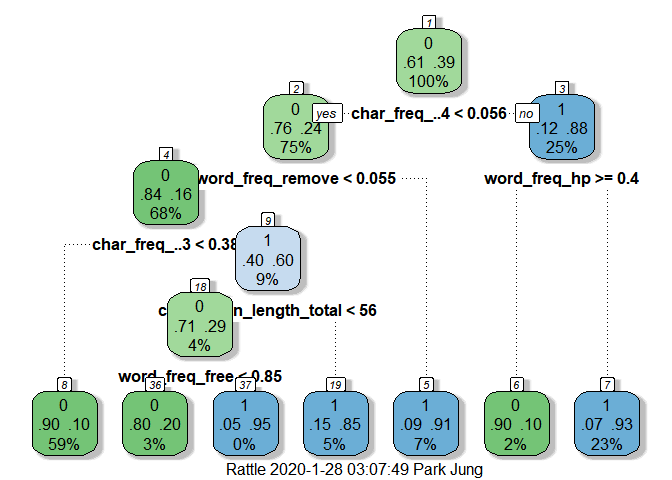
rpart_spam_predict<-predict(rpart_spam_pruning, test, type ='class')
confusionMatrix(rpart_spam_predict, test$class) #생성된 트리 모형의 평가(정확도, 민감도, 특이도 등)
## Confusion Matrix and Statistics
##
## Reference
## Prediction 0 1
## 0 796 100
## 1 40 443
##
## Accuracy : 0.8985
## 95% CI : (0.8813, 0.9139)
## No Information Rate : 0.6062
## P-Value [Acc > NIR] : < 2.2e-16
##
## Kappa : 0.7832
##
## Mcnemar's Test P-Value : 6.151e-07
##
## Sensitivity : 0.9522
## Specificity : 0.8158
## Pos Pred Value : 0.8884
## Neg Pred Value : 0.9172
## Prevalence : 0.6062
## Detection Rate : 0.5772
## Detection Prevalence : 0.6497
## Balanced Accuracy : 0.8840
##
## 'Positive' Class : 0
##
Random Forest
랜덤포레스트에 대한 설명은 링크를 참고해주세요.
data_rf <- randomForest(class ~ ., data = train)
data_rf
##
## Call:
## randomForest(formula = class ~ ., data = train)
## Type of random forest: classification
## Number of trees: 500
## No. of variables tried at each split: 7
##
## OOB estimate of error rate: 4.93%
## Confusion matrix:
## 0 1 class.error
## 0 1893 59 0.03022541
## 1 100 1170 0.07874016
plot(data_rf) #나무의 갯수에 따른 오차율
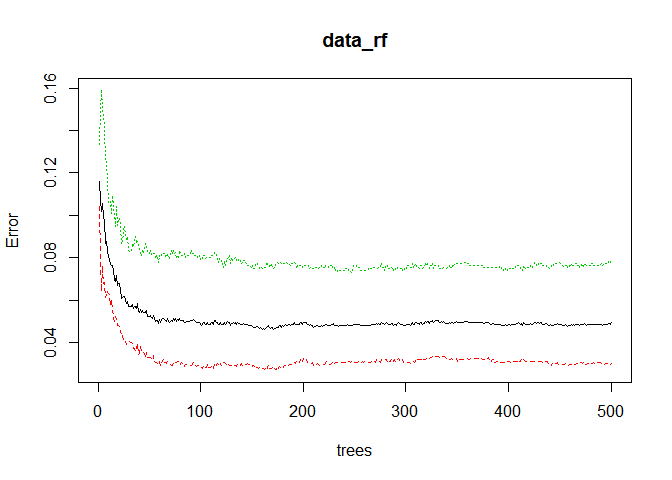
varImpPlot(data_rf) #변수 중요도(그래프에서 상단에 있을 경우 Label Data의 Class을 분류하는데 모델이 많이 활용하는 변수)
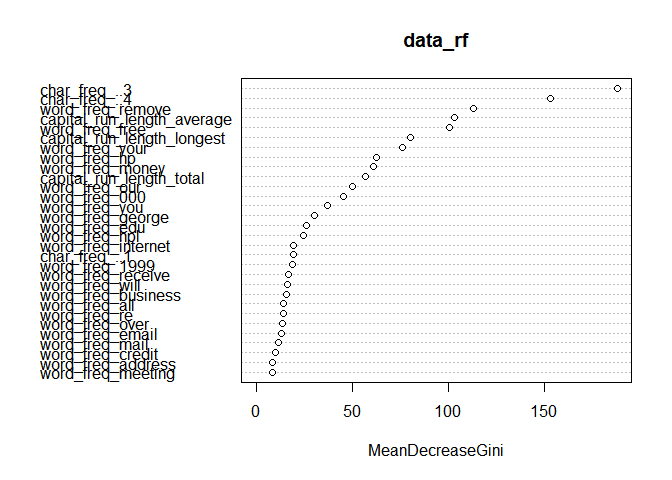
data_rf_predict <- predict(data_rf, test, type = "class")
confusionMatrix(data = data_rf_predict, reference=test$class) #생성된 RF모형의 평가(정확도, 민감도, 특이도 등)
## Confusion Matrix and Statistics
##
## Reference
## Prediction 0 1
## 0 809 45
## 1 27 498
##
## Accuracy : 0.9478
## 95% CI : (0.9347, 0.9589)
## No Information Rate : 0.6062
## P-Value [Acc > NIR] : < 2e-16
##
## Kappa : 0.89
##
## Mcnemar's Test P-Value : 0.04513
##
## Sensitivity : 0.9677
## Specificity : 0.9171
## Pos Pred Value : 0.9473
## Neg Pred Value : 0.9486
## Prevalence : 0.6062
## Detection Rate : 0.5867
## Detection Prevalence : 0.6193
## Balanced Accuracy : 0.9424
##
## 'Positive' Class : 0
##
모형 평가, 해석 및 선택
모형의 평가는 분류모형의 경우 혼동행렬(Confusion Matrix)에 기반하여 각 모형에 대한 정확도, 민감도, 특이도 등을 고려하여 종합적으로 평가하게 됩니다.
평가의 결과를 통해 두 모형 중 어떠한 모형으로 결정할 지 선택하게 됩니다.
시간이 너무 늦어 자세한 내용은 추후 업데이트하겠습니다.
오늘도 감사합니다.^^